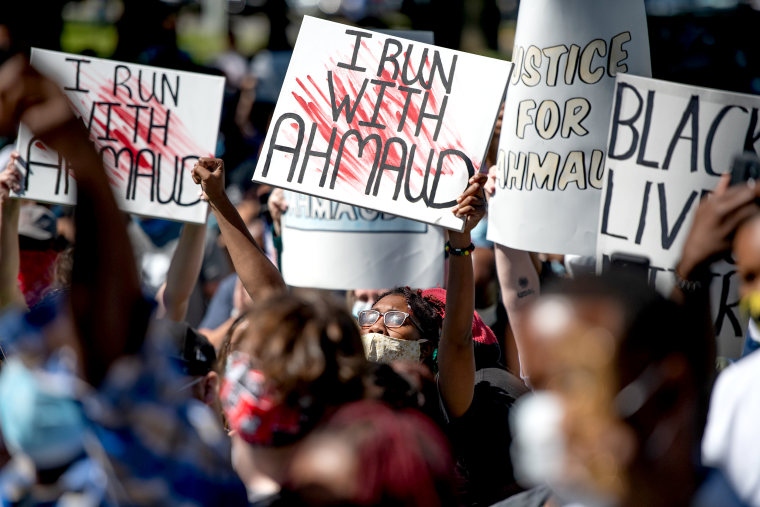The killing of Ahmaud Arbery, a black man who his family says was out for a jog when two white men followed and shot him, has put a sharp focus on open carry, citizen's arrest and "stand your ground" laws — and when claims of self-defense rightfully apply.
Legal experts and lawyers familiar with laws in Georgia, where the altercation on the afternoon of Feb. 23 escalated near the coastal gateway community of Brunswick, said the prosecution's case may hinge on cellphone video that was leaked publicly on social media last week, provoking a national outcry.
The video appears to show Arbery's final moments during a fight on a two-lane residential street in the Satilla Shores subdivision. The Georgia Bureau of Investigation followed up its review with the arrest Thursday of Gregory McMichael, 64, and his son Travis, 34, on charges of felony murder and aggravated assault. It's unclear whether the McMichaels have an attorney.
"I've never seen a video create so much of a public stir as this one has," said Ronald Carlson, a professor emeritus at the University of Georgia School of Law.
A newly appointed district attorney is preparing to present evidence to a grand jury. As the case unfolds, Carlson said, it will be up to prosecutors to make it clear who initiated the incident, who was the aggressor and whether the McMichaels' actions were unreasonable and unjustified under the law.
Previous prosecutor defends actions
The first district attorney in the case, Jackie Johnson of the Brunswick Judicial Circuit, had to recuse herself because Gregory McMichael, a former Glynn County police officer, was an investigator in her office until he retired a year ago.
In the weeks after the shooting, a second district attorney assigned to the case, George Barnhill of the Waycross Judicial Circuit, declined to pursue charges. He wrote in April that there was no probable cause to issue arrest warrants, and he later recused himself because of a conflict of interest. (The new prosecutor, District Attorney Joyette Holmes of the Cobb County Judicial Circuit, hails from metro Atlanta, a few hours away.)
Barnhill wrote to a Glynn County police captain that the McMichaels had "first hand probable cause" to pursue Arbery and that they had told police that they believed he was a "burglary suspect" in their neighborhood.
"It appears their intent was to stop and hold this criminal suspect until law enforcement arrived," Barnhill wrote. "Under Georgia Law this is perfectly legal."
Surveillance video appears to show Arbery, 25, wandering inside an unoccupied home under construction on the McMichaels' block just before they pursued him.
During the chase, Gregory McMichael was armed with a .357 Magnum, while Travis McMichael held a shotgun, police said.
"Under Georgia Law this is legal open carry," Barnhill wrote.
Finally, after reviewing a video recorded by a third man — a neighbor of the McMichaels who joined them in pursuing Arbery — Barnhill said it was Arbery who appeared to attack Travis McMichael during a struggle over the shotgun.
NBC News does not know what occurred before the events shown in the video. Attorneys for Arbery's family have said he was unarmed and was on a routine jog.
But Barnhill concluded in his memo that "given the fact Arbery initiated the fight, at the point Arbery grabbed the shotgun, under Georgia Law, McMichael was allowed to use deadly force to protect himself."
Was a citizen's arrest legal?
Georgia does permit private arrests, although lawyers say it's more likely to happen in low-level offenses such as shoplifting.
According to the doctrine, "a private person may arrest an offender if the offense is committed in his presence or within his immediate knowledge. If the offense is a felony and the offender is escaping or attempting to escape, a private person may arrest him upon reasonable and probable grounds of suspicion."
Other states' laws on citizen's arrests vary: Massachusetts, Pennsylvania and Wisconsin, for instance, allow arrests only for suspected felonies and if they were personally witnessed.
While Georgia's law is broader, conducting a citizen's arrest is uncommon and ill-advised in general, said Mark Shelnutt, a criminal defense lawyer, adding that "it's a dated idea out of 'The Andy Griffith Show.'" (The state's law actually stretches back much further, to the Civil War era.)

The McMichaels told police they believed Arbery was a suspect in a string of burglaries in the community. Police records, however, show that only one incident was reported in the neighborhood — that of a weapon stolen Jan. 1 from an unlocked truck parked outside the McMichaels' home.
Carlson said a grand jury will likely examine whether the McMichaels were engaged in a lawful citizen's arrest.
"The argument could be made that they thought he was a burglary suspect and they believed they had good information he had trespassed on a property already shortly before the incident occurred, and that was their defense in pursuing him," Carlson said.
But because citizen's arrests are rare, he said, a jury "is going to wonder why in the world [the McMichaels] took this action and why they didn't call the police and let the police sort out the situation."
If Arbery was running away, he wouldn't have been a threat, either, Carlson said. The law, he added, "isn't a license to kill."
Claiming self-defense
A second component is whether the McMichaels were acting in self-defense and had the right to use deadly force, as Barnhill wrote.
Georgia's stand-your-ground law was enacted in 2006, and it was unsuccessfully challenged in 2012 in the wake of the fatal shooting of Trayvon Martin in Florida. The death of Martin, an unarmed black teenager, and other high-profile cases, including the fatal shooting of a black father in a Florida parking lot in 2018, have led to calls for repeal based on arguments that stand-your-ground laws appear to disproportionately harm people of color.
A report in February by the U.S. Commission on Civil Rights examined the racial disparities in the law, finding that there "is some statistical evidence that [stand-your-ground] laws do not have a significant racial disparate impact." Still, the perception of recent cases reinforces "that rather than protecting the innocent, Stand Your Ground continues to resonate in tragedy."
Under Georgia's law, people who believe their life or property is being threatened don't have to retreat and can use deadly force if they think it's necessary to prevent their own death or "great bodily injury" to themselves or other people or to prevent a "forcible felony," such as rape.
But there are also exceptions when lethal force wouldn't be justified — if the person who used deadly force:
- Was the aggressor and didn't try to withdraw from the situation.
- Initially provoked the other person intending to use force as an excuse to inflict harm.
- Was engaged in criminal activity at the time.
"The key thing here is you cannot have instigated the incident and then say you had to kill the other person because you're defending yourself," said James Yancey Jr., a defense lawyer in Brunswick.
Download the NBC News app for breaking news and alerts
When homeowners or business owners are confronted by a robber on their own property, use of deadly force can appear more cut and dried, although there have been numerous cases in Georgia in which stand-your-ground defenses have led to trials.
Last year, Shelnutt defended Eddie Clayton, who claimed self-defense in his home when he shot another man four times during a dispute over cigarettes. Evidence showed that the other man had attacked first and that even after Clayton brandished a weapon to scare him off, the other man continued to attack, prompting Clayton to shoot him. A jury found him not guilty of murder.
Shelnutt said that taking a life is serious and that even if someone has the right to do so under the law, it's going to require a thorough review by police, prosecutors and even a grand jury.
In the case of the McMichaels, "it would be hard to understand why they wouldn't have been arrested," Shelnutt said. "When someone loses their life under such circumstances as [Arbery] did, including amid two people with guns and a struggle, it's a real reach to me that the DA figured out everything based on the word of those with the weapons."
Carlson said a defense team could posit that the gun went off unintentionally, akin, at worst, to involuntary manslaughter.
Experts said a self-defense claim would crumble if a jury were to decide that the McMichaels had no "immediate knowledge" to believe that Arbery was the suspect in a crime and warranted being stopped via a citizen's arrest and instead decided that they were the aggressors by chasing him.
Yancey said the video could be interpreted this way: Arbery, who appeared to be caught between two vehicles, was standing his ground and defending his life when he tussled with an armed Travis McMichael to prevent him from using his gun. But the shotgun fired, and Arbery collapsed on the road.
"He has the right to protect himself, too," Yancey said, adding that the video can't show what was running through Arbery's mind when he saw the McMichaels.
"One fact that's important is him being a black man and seeing two white men with guns. Given the long racial history this country has had, that's not good optics," Yancey said. "There's nothing in that situation that will look good to any black man."



